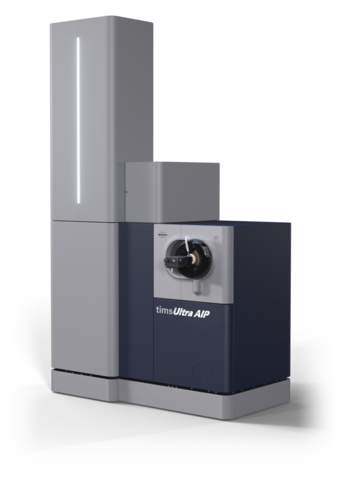Breakthrough Athena Ion Processor (AIP) delivers up to 35% more peptide and 20% more protein identifications for highest sensitivity proteomics
At the 73rd Conference on Mass Spectrometry and Allied Topics (ASMS), Bruker Corporation (Nasdaq: BRKR) today announced significant further advances in ultra-high sensitivity 4D-Proteomics™ with the introduction of the timsUltra AIP mass spectrometer. Its innovative, breakthrough Athena Ion Processor (AIP) technology further boosts the extreme sensitivity of timsTOF Ultra PASEF® methods for key biological and clinical research problems with very low sample amounts.
This press release features multimedia. View the full release here: https://www.businesswire.com/news/home/20250602810313/en/

timsUltra AIP mass spectrometer
New timsUltra AIP is Delivering Breakthrough Sensitivity
The timsUltra AIP further enhances sensitivity by featuring the new AIP technology for further significant advances in high-sensitivity, high-throughput applications on complex biological samples, such as fine-needle aspiration (FNA) tumor biopsies, immunopeptidomics, single-cell proteomics, and metaproteomics. The sensitivity boost is delivered through the novel AIP technology allowing enhanced product ion transfer and optimal orthogonal TOF sampling of MS/MS fragment ions.
With up to 20% gains in protein identifications and up to 35% gains in peptide identifications—depending on the application—the timsUltra AIP system delivers enhanced sensitivity and sequence coverage for sample-limited applications such as single-cell studies. It also enables more comprehensive ion coverage for de novo peptide sequencing and immunopeptidomics neoantigen discovery. Jennifer Van Eyk, Director of Basic Science Research in the Barbra Streisand Women’s Heart Center and Professor of Cardiology at Cedars-Sinai in Los Angeles, stated: "With the new timsUltra AIP, we are able to gain much deeper proteomics insights into particularly challenging-to-study single cardiomyocytes. The sensitivity, throughput, and robustness of the timsUltra AIP enables us to gain novel insights into cardiovascular diseases."
Nikolai Slavov, Professor of Bioengineering, Director of the Single-Cell Proteomics Center at Northeastern University, and Founding Director of the Parallel Square Technology Institute, commented: “The new timsUltra AIP delivers a 3-fold sensitivity gain for peptide fragment ions in single-cell proteomics, which bolsters peptide sequence identifications and enables proteomic analysis at a new level of sensitivity, e.g., even for small red blood cell precursors.”
Metaproteomics presents unique challenges as it must contend with highly diverse and dynamic proteome mixtures derived from numerous, often genetically uncharacterized microbial species. The vast search space and sequence homology among microbes increases false discovery rates and hinders accurate taxonomic and functional assignment. These challenges are being addressed by TIMS-enhanced ultra-high sensitivity of the timsUltra AIP.
David Gómez-Varela, Director of the Center of Excellence of Metaproteomics at the University of Vienna in Austria, said: “We live in a microbial world, where trillions of microorganisms shape the health of every ecosystem. Yet the protein-level signatures that reflect bacterial activity remain largely elusive due to sensitivity limitations. With the new timsUltra AIP, we can now detect bacterial peptides in the sub-picogram range, reflecting the level of a single bacterium’s proteome — a major leap in sensitivity. This enables exploration of microbial life in unprecedented detail, unlocking new insights into the functional diversity of microorganisms.”
Breaking News: Preliminary data shows that in combination with the new Evosep Eno nLC system (Evosep Biosystems, Odense, Denmark), the timsUltra AIP can deliver over 5000 protein identifications at 250 pg (sample amount of a single HeLa cell) with a throughput of 100 samples per day (SPD). Even at 500 SPD, with less than 2.5 minutes per sample injection, more than 2000 proteins can be identified. This high-throughput capability, combined with ultra-high sensitivity, is a game-changer for applications requiring both depth and scale—such as rapid immunopeptidomics neoantigen profiling from FNA biopsies, single-cell proteomics, deep visual proteomics, and the complex challenges of metaproteomics.
About Bruker Corporation – Leader of the Post-Genomic Era (Nasdaq: BRKR)
Bruker is enabling scientists and engineers to make breakthrough post-genomic discoveries and develop new applications that improve the quality of human life. Bruker’s high performance scientific instruments and high value analytical and diagnostic solutions enable scientists to explore life and materials at molecular, cellular, and microscopic levels. In close cooperation with our customers, Bruker is enabling innovation, improved productivity, and customer success in post-genomic life science molecular and cell biology research, in applied and biopharma applications, in microscopy and nanoanalysis, as well as in industrial and cleantech research, and next-gen semiconductor metrology in support of AI. Bruker offers differentiated, high-value life science and diagnostics systems and solutions in preclinical imaging, clinical phenomics research, proteomics and multiomics, spatial and single-cell biology, functional structural and condensate biology, as well as in clinical microbiology and molecular diagnostics. For more information, please visit www.bruker.com.
View source version on businesswire.com: https://www.businesswire.com/news/home/20250602810313/en/
Contacts
Media Contact
Petra Scheffer
Bruker Daltonics Marketing Communications
T: +49 (421) 2205-2843
E: petra.scheffer@bruker.com
Investor Relations Contact
Joe Kostka
Director, Investor Relations
T: +1 (978) 313-5800
E: Investor.Relations@bruker.com





